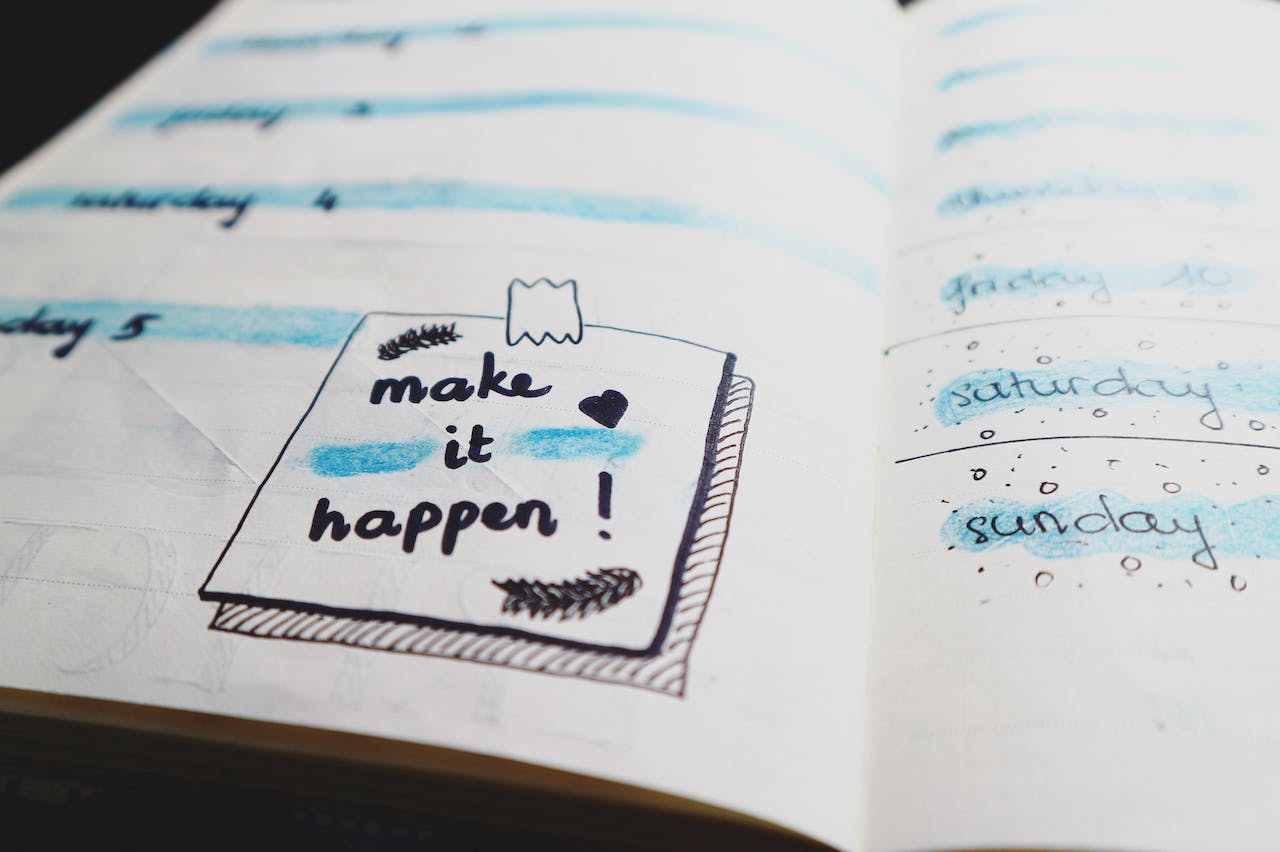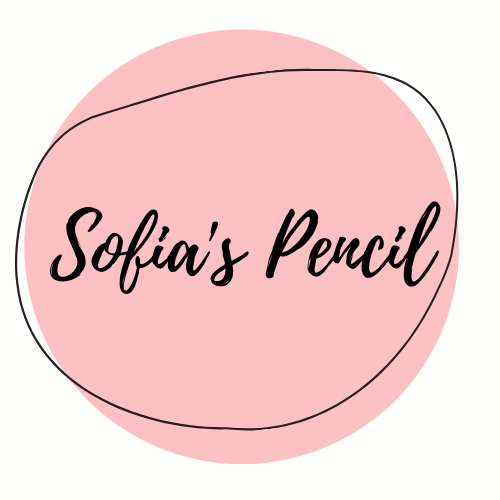If in my last post about journaling I told you why you should start journaling, today I’m compiling a list of tips about how to start writing a journal. As I mentioned, I know journaling can seem daunting when you don’t usually write for yourself. You could even think that you are terrible at writing, so why bother?
But the truth is, you don’t have to be good at writing to start journaling! In fact, no one apart from you would usually be reading your entries so you can ramble as much as you want and develop your own style. And who knows? Maybe you will love writing, develop your skills, and become the next Agatha Christie. Or E. L. James.
So, do you want to know how to start writing a journal? Let’s dive into it.
Easy Tips to Start Journaling
Set up a schedule
If you’ve never written before, you want to develop the habit of journaling. As you would do with work or the gym, you might need to set up a schedule to write.
It doesn’t have to be a very strict schedule, but make sure you save some time to write for like half an hour (or more, if you’d like to), either at the beginning of your day or before going to bed.
For me, when I was working in the restaurant, I used to use one hour of my two-hour break to jump into a nearby Starbucks to write and unwind from the craze of lunchtime.
Before it becomes natural for you, though, you might need to put some more effort into reminding yourself to write. Scheduling when you want to write and setting up an alarm on your phone will help you remember to sit down and journal. Before you realise it, it will have become a (very good) habit.
Finding the right space to write
As well as finding the perfect time for writing, you’ll have to find a good spot to do it. But in fact, the appearance or design of the space is totally up to you.
Some will say it’s easier to focus in a quiet place, where you have everything at hand, like an office. And of course, this is always a great option. But you might not have space for even the smallest office in your home. You could also find that you link your office to a workplace, and might not feel comfortable letting your feelings out in such a place.
So I always suggest finding out what works for you, even if it takes a little experimenting. I love writing in coffee shops, because of the background music and noise, and because everybody is minding their own business (also, CAKE at hand). For yourself, the kitchen table might be a great place to write, as the kitchen is a space where people don’t usually spend a lot of time and where you might have plenty of space or light. In fact, I usually work in the kitchen when I’m at my parents’ in Spain (my kitchen here is a bit of a nightmare, but theirs is so big and bright, and beautiful!).
Just find the space that works for you. Maybe that space is a little corner in your bedroom where you can set up a few cushions and a fluffy rug, the quietest table in your favourite coffee shop or under a big tree in a nearby park.

Buy something you can write on!
Guess what: The only thing you need to start a journal, besides the willingness to do it, is… a journal!
Whether this is a physical journal, an app on your phone, or a document on Word or Google Docs, you’ll need something to capture your thoughts.
I love to write on paper. I find that writing on paper makes your thoughts more tangible, more real: after all, they will always be on that piece of paper, whilst if you keep your journal on your laptop or your phone, it kind of still lives in the subjective, in the World of the Ideas (as Plato would say). I like knowing that it can’t be erased, that those thoughts and feelings are always going to be on that piece of paper and that I will have to destroy it to get rid of them… If they were on Word, for example, I could always go back and erase what I didn’t like from my previous experience. I don’t know what would be the point, but I’m sure I would do it!
Besides, journals are BEAUTIFUL! You don’t have to write your memories and thoughts in a plain, black diary anymore. There are lots of options out there, some of which actually include journal ideas to write about, pages to draw and colour, etc. I was gifted Wreck this journal years ago for my birthday and it was really fun. It was really creative idea and I loved it.
So, if you think you’ll need some inspiration, why not get yourself a beautiful, inspirational journal?
Write naturally, quickly and without constraints
If you haven’t ever written a journal before, you may feel like you don’t know where to start. Even when you have already bought your journal, set up your writing schedule, and designed the perfect spot, the hardest (and most fun) part is yet to come. You might feel like you need to write perfectly, think about every single sentence, and be grammatically correct. But the truth is, you don’t have to!
You’ll make the most of your journaling if you don’t think too much about what you’re writing. Of course, grammar is always important (I studied languages and I’m a nerd, so obviously grammar is important for me) but if no one else is going to read your diary, you could not use a single full stop throughout the whole of it and it would still be fine… As long as you understand yourself, that is!
There’s no right or wrong way to journal. I would even advise you to not follow any rules, but yours. Try not to adapt your writing to anything you’ve read or seen before, and don’t let writer’s block get you! (Although, as my Creative Writing teacher said, writer’s block is for people who made a living out of their writings, so it probably doesn’t apply to you and me… yet! But you know what I mean).
If you feel like there is nothing you want to write about, like you are not inspired today, just ramble. Start writing about your day and something will come up eventually. Set up a timer (somewhere between 10 and 30 minutes should be enough) and write anything that comes to your mind. Draw if you want to. Just keep moving that pen, so you don’t lose the habit. Next time it will be easier!

Ideas for Journal Writing
Now that you know where to start and how to prepare yourself for daily journal writing, you might ask yourself:
«OK, but wait a minute… What do you write about in a journal?»
And I completely understand your question. Sometimes you sit in front of a paper and you end up like: «Cool, now what? Just write about my day? But my day was so boring. And I’m just tired. And I don’t have anything going on at the moment…»
So I thought you might find it useful if I gave you some ideas for journal writing.
Journal about your activities
What have you been up to today (or maybe yesterday if you write in the mornings)?
Writing about what’s going on in your life is probably the most common way of journaling. It can be interesting when you’re trying to develop the habit of writing, or if you’re looking to discover any patterns in your behaviour.
If you are unsure about where to start, you can ask yourself questions such as:
- What time did I get up?
- What did I have for breakfast?
- Did something happen on my way to work?
- Who did I talk to today?
- How did I feel throughout the day?
- What am I currently working on? Am I enjoying it or would I rather be doing something else?
They’re simple questions, where you are not trying to get deep into the answers. Although of course, you could if you’d like!
Journal about what makes you happy
As I previously said, journaling is a wonderful help for feeling grateful. In times when you might need some extra support, when you are a bit down or indecisive, you can always write an entry about the things that make you happy or come back to old entries where you are talking about them.
Check out some inspiring journaling prompts:
- Make a list of 10 (or more) things that make you smile
- Write about the people who always make you feel good
- What made you last laugh?
- How would a dream day look to you? Is there a way you can make tomorrow somewhat similar to this dream day?
- Write about your favourite childhood memory. How did you feel at the time?

Journal about what scares you
Fun fact:
Things are usually scarier in your head than in the real world
Writing about our fears or worries helps us see the big picture by turning us into narrators instead of victims. When you write about what scares you, it becomes clearer what could be the root of the problem and how you could fix it. It kind of brings the problem to the Earth and materialises it. Which makes it easier to handle.
Plus, it’s a very good way of venting about something you might not feel comfortable with telling a friend.
These are some of the questions you could ask yourself when writing about what worries you:
- What is EXACTLY making you uncomfortable now? By naming it, you’re addressing the problem per se, not just the feelings, which you might not be able to change
- Why is it bothering you?
- Is this a regular worry that comes to you from time to time or is it a new friend of your anxiety?
- What are you currently struggling with? List 3 things that scare you (no more than 3, we don’t want you to feel overwhelmed!)
- What will you do to address your worries?
Journal about your goals
I said it already and I’ll say it again if necessary:
Writing a journal helps you achieve your goals!
This could make for a whole new post, but journaling about your goals, your achievements, and your struggles is a great way to keep moving forward. It’s perfect to stay motivated, work harder on your weaknesses, and enhance your strengths. It helps you understand where you are on the path to your dream life and what your next steps should be.
Some of the things you could reflect on when writing about your goals are:
- What does your dream life look like?
- Are you moving towards your life goals? What are they?
- What habits do you have that support your dream life?
- Could you implement new habits that would support your dream life?
- What have you achieved today/this week with regard to your top goals?
- Think about your future self. What do they look like? What are they doing? How did they get to where they are now? Do you think they would have some advice for your present self?
Journal about your decisions
Making decisions is hard. I know that, you know that, everybody and their cat knows that! However, writing a journal can give you clarity about those questions that you find hard to answer.
It works like the Socratic method (you know, the Greek philosopher Socrates, who used to walk around Athens questioning everybody about their values and decisions in life). But you won’t need a wise, old Greek man to ask you the questions here: it will be you who is asking (and answering) them.
This will definitely help you see the matter from different angles, which hopefully will help you decide wisely!

Now you know how to start a journal!
This is pretty much all I can tell you about how to start a journal. Now, the best way of seeing the (great) results of writing a journal is to start writing yourself. So why not get a beautiful notebook and some pens and give it a try today?
Do you write a diary? How has it helped achieve some of your goals? Let me know in the comments below!
Sof

